Georgia Tech Scientist Boosts Forestry Industry With Cutting-Edge Tree Cloning
Oct 10, 2024 — Atlanta, GA

Ulrika Egertsdotter, a principal research scientist at the Renewable Bioproducts Institute and a renowned expert in seed cloning, designs and develops automated technologies that produce valuable plants for the state’s forestry, agriculture, and horticulture industries. (Credit: Chris McKenney)
Georgia’s forestry industry generates $40 billion annually, providing 140,000 jobs. The state is known for its timber, fiber, paper pulp, and other wood-derived products, which are exported worldwide.
Ulrika Egertsdotter, a principal research scientist at Georgia Tech’s Renewable Bioproducts Institute, plays a key role in supporting the industry. Through her work, she helps Georgia tree growers propagate new plants that provide higher-quality wood products and offer greater resilience to climate change.
“Some say we shouldn't interfere with nature, but humans are demanding more and more from the Earth, faster than it can provide,” Egertsdotter said. “We need to help nature produce at a sustainable rate and quality necessary for human requirements.”
Her primary research involves applying new technologies and automation to produce improved conifer trees, which include spruce, cedar, and — most notably in Georgia — pine. These needle-bearing trees are some of the most important globally for providing wood and fiber.
Plant breeders want to reproduce trees or plants with excellent traits — for example, those that can grow in dry environments or resist fungal attacks. Developing a robust plant that meets these requirements can take decades, particularly with trees, which need many years to grow.
That’s where Egertsdotter’s work comes in. Scientific advancements have enabled researchers to design new plants, including trees that yield better wood products or are more resilient against extreme weather conditions such as drought. Producing enough of these special, superior plants requires efficient cloning techniques — otherwise, it would take years or even generations.
Cloning plants in vitro, or micropropagation, is exponentially faster than traditional cloning by cuttings and helps growers produce more trees and harvest high-quality timber on shorter timelines. For conifers, the favored micropropagation method is to clone the seeds by a technique called somatic embryogenesis (SE), which is the basis for making new and better conifer trees using biotechnological methods.
“In the lab, with one plant seed, we can make millions of plants from that same seed,” Egertsdotter said.
Cloning Trees in the Lab
Cloning conifers like pines always starts with picking seeds from the cone. Then, in a sterile lab environment, researchers clean a single seed and extract an embryo from inside it. They place the embryo in a small dish with nutrients and plant-growth regulators that stimulate the embryo to form new embryos.
By repeatedly feeding the culture with the same treatments, the new embryos will continue to multiply into identical copies of the initial seed. Once the number of embryos has increased significantly, the researchers split them up into new plates. When, finally, many embryos have developed, other treatments are applied to make the embryos mature and eventually germinate into a new plant.
“The biological process the lab (somatic) embryo goes through to form the plant is the same biological process a seed embryo would go through if it was planted in the ground,” Egertsdotter explained. “This method allows us to generate many plants from each valuable seed, instead of just one.”
Automated Technologies
While micropropagation methods have been around for decades, they are expensive and labor-intensive and are not widely used outside of research labs. Egertsdotter works closely with engineers to develop and implement novel automation technologies that can produce affordable, high-quality plants through a system based on fluidics technology, image analysis, and AI-based selection.
The SE Fluidics System is a unique facility developed at Georgia Tech for the fast processing of somatic embryos of any species. The system carries out rapid imaging of each embryo and then produces datasets to develop algorithms that select viable embryos for further processing.
In addition to cloning selected plants from breeding programs, SE can also be used to add desired characteristics to trees and plants. Researchers have also started experimenting with the gene-editing tool CRISPR to modify the DNA sequences of some tree species.
Moving Forward
Because of human-caused climate change, the natural habitats of many important plants and crops have already been permanently altered or destroyed. For Egertsdotter, this adds urgency to her work.
She is currently investigating how to develop pine trees more resistant to climate-related stresses, including pests and drought. Egertsdotter is also studying how to use biotechnological tools to create trees that capture carbon dioxide more efficiently.
“We must support the plants we rely on by multiplying the specific plants that can survive in the future environment,” Egertsdotter said. “We can also help other plants survive by genetic or genomic modifications to increase their adaptability.”
She added, “We will lose a lot of the natural resources we currently rely on if we wait for nature to, through natural selection, correct the negative impact of climate change. We are changing the natural world faster than evolution can keep up, so we must help accelerate the adaptation process.”
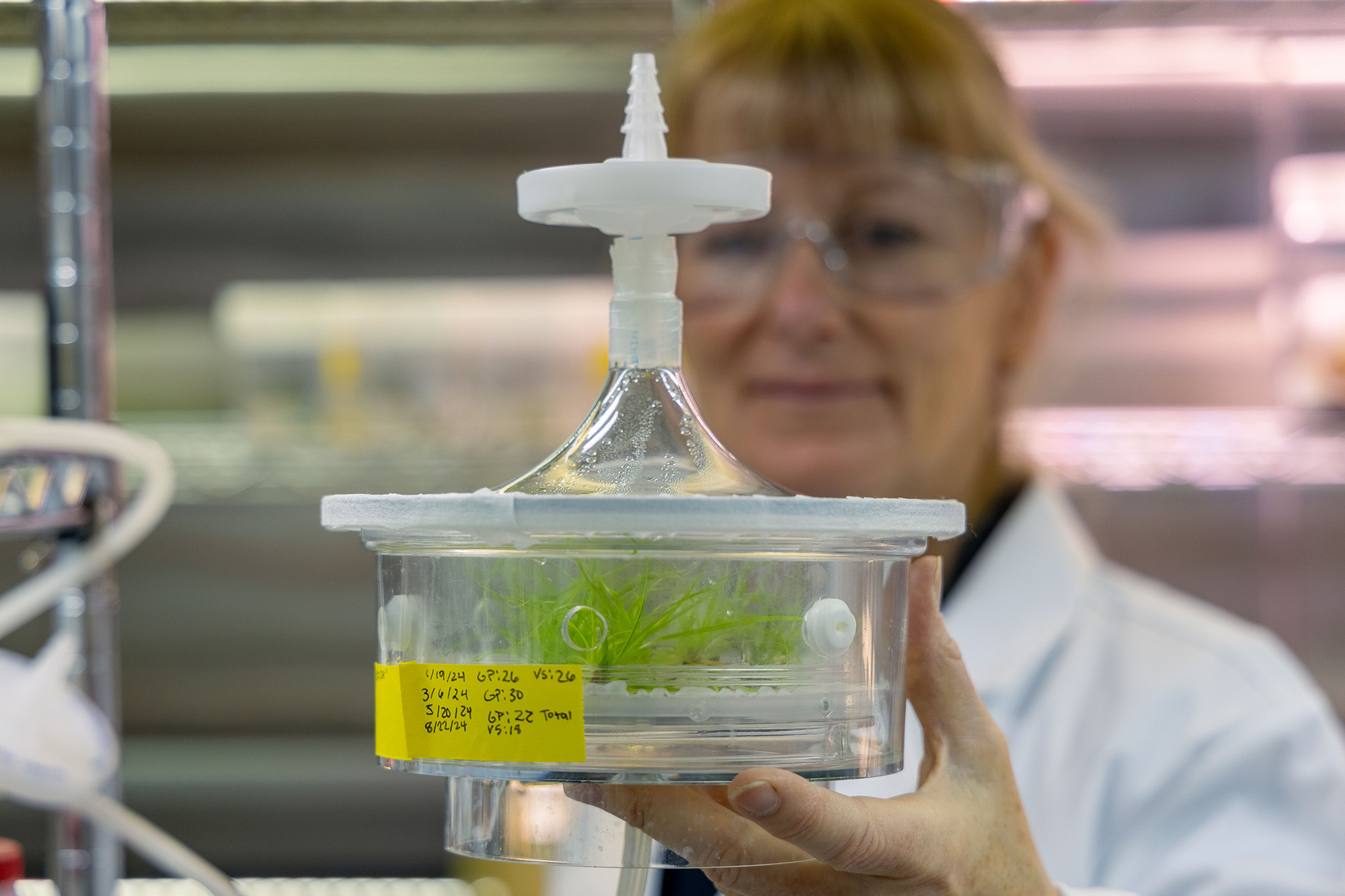
The team uses bioreactors for fast multiplication of young plants or maturation of somatic embryos which will later be harvested. Feeding is controlled electronically through a solenoid valve. (Credit: Chris McKenney)
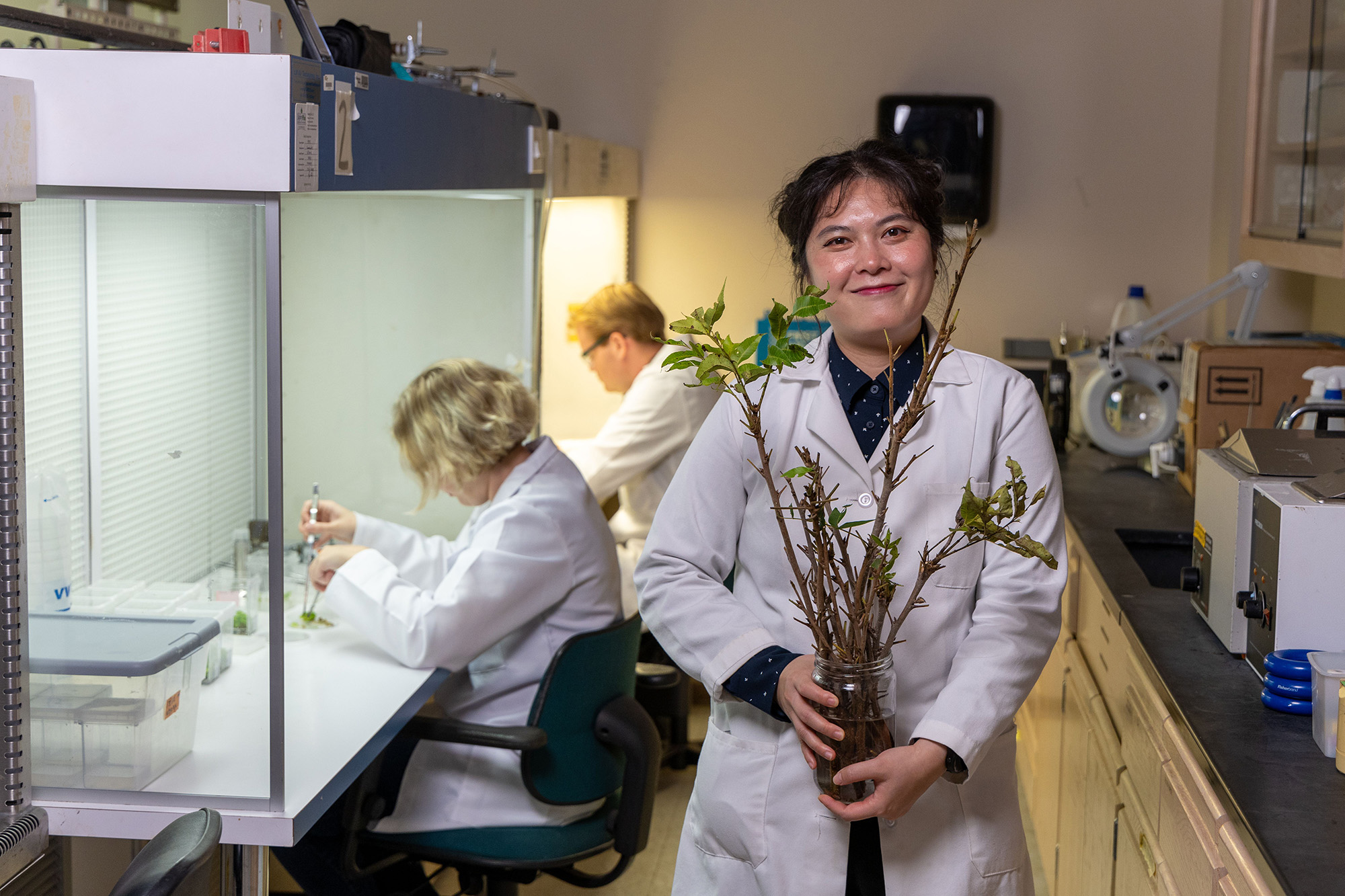
Postdoctoral fellow Cuong Le holds pecan tree shoots used to start in vitro cultures while researchers work to maintain established in vitro cultures under sterile conditions. Pecan trees in Georgia are susceptible to pests and natural disasters, and Egertsdotter's team works to produce more resilient pecan plants. (Credit: Chris McKenney)
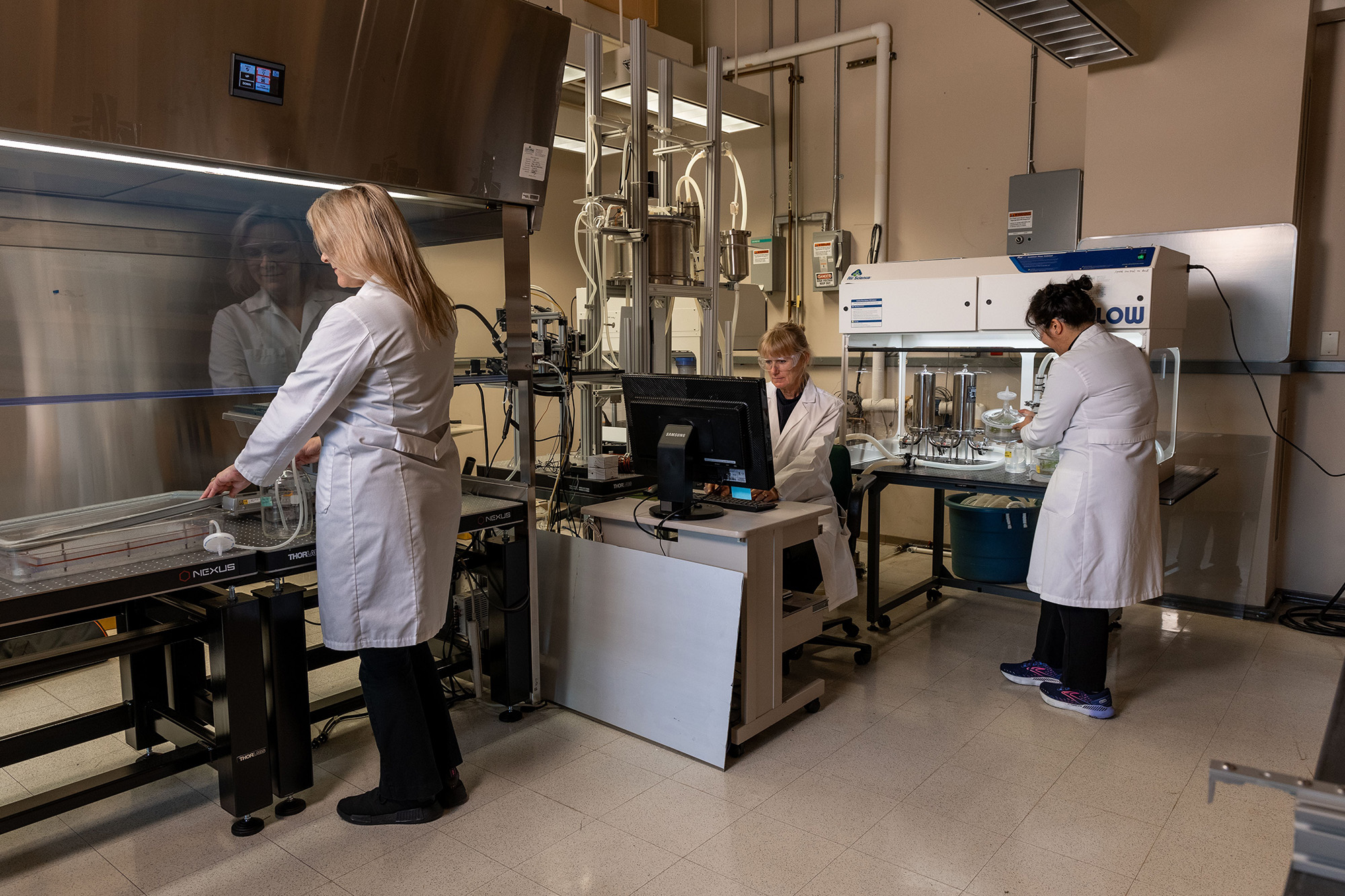
Egertsdotter and faculty from the School of Mechanical Engineering developed the SE Fluidics System (pictured). It is a unique facility at Georgia Tech designed for fast processing of somatic embryos of any species. The system carries out rapid imaging of each embryo and then produces datasets to develop algorithms (including machine learning) to select viable embryos for further development into plants. (Credit: Chris McKenney)
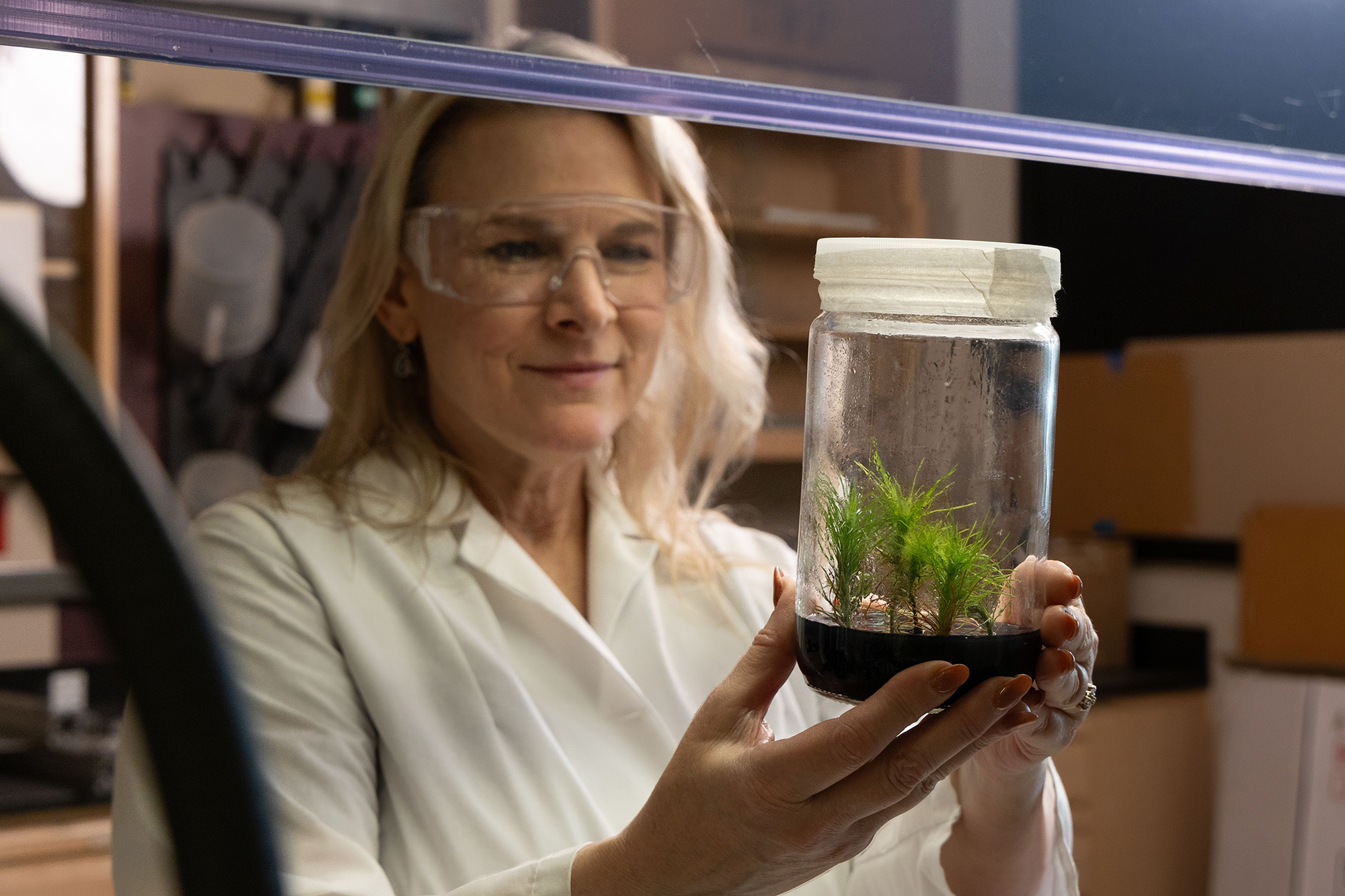
Shannon Johnson, research scientist III in the School of Mechanical Engineering, examines a young plant while working with the SE Fluidics System. (Credit: Chris McKenney)
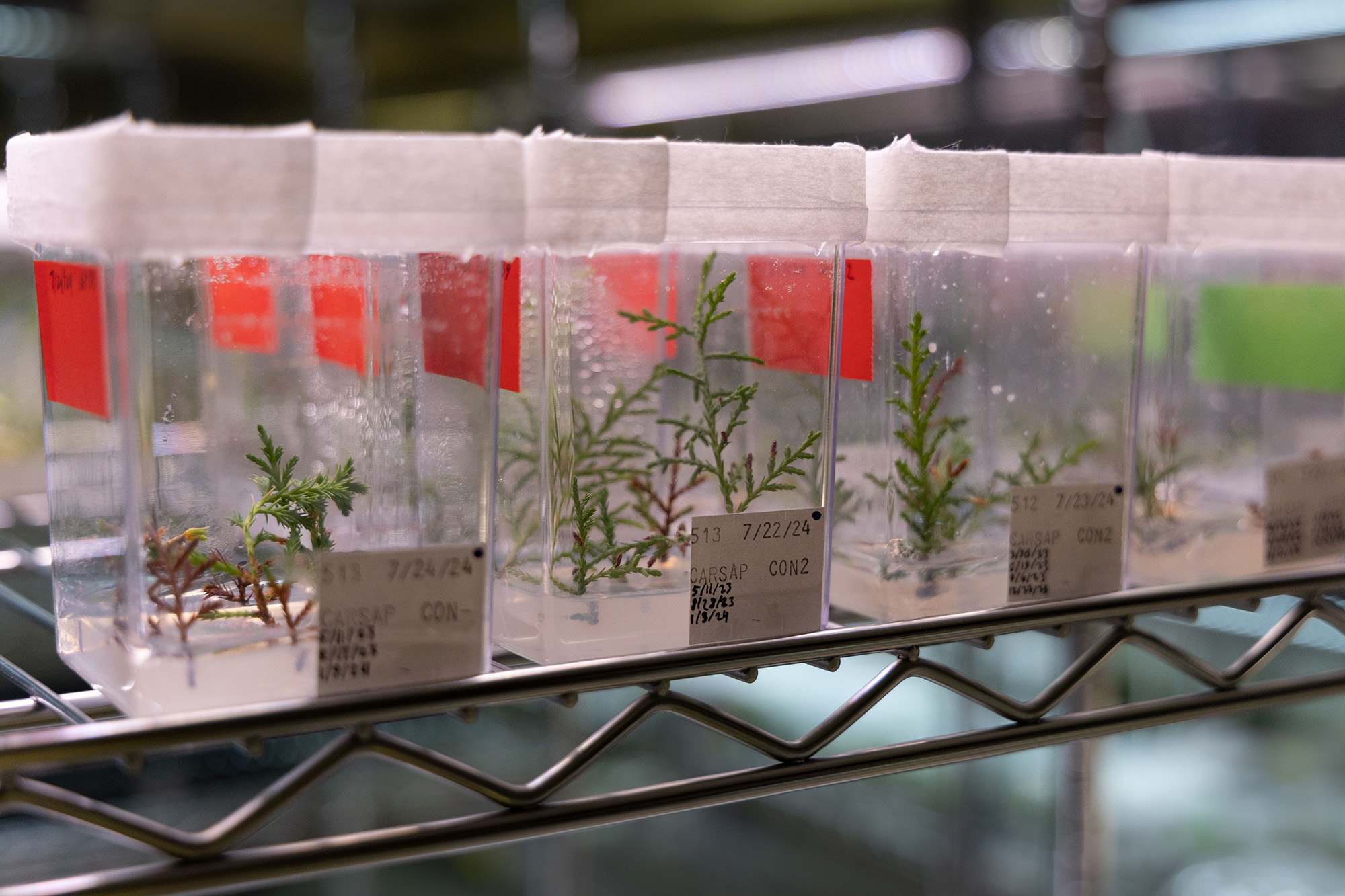
Baby conifer seedlings from elite plant lines that have been cultivated in Egertsdotter's lab. (Credit: Chris McKenney)
Catherine Barzler, Senior Research Writer/Editor





